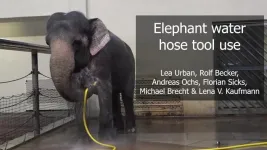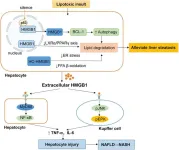(Press-News.org) Tool use isn’t unique to humans. Chimpanzees use sticks as tools. Dolphins, crows, and elephants are known for their tool-use abilities, too. Now a report in the Cell Press journal Current Biology on November 8, 2024, highlights elephants’ remarkable skill in using a hose as a flexible shower head. As an unexpected bonus, researchers say they also have evidence that a fellow elephant knows how to turn the water off, perhaps as a kind of “prank.”
“Elephants are amazing with hoses,” says Michael Brecht of the Humboldt University of Berlin, one of the senior authors. “As it is often the case with elephants, hose tool use behaviors come out very differently from animal to animal; elephant Mary is the queen of showering.”
The researchers made the discovery after the paper’s other senior author Lena Kaufmann (@lena_v_kaufmann), also of Humbolt University of Berlin, witnessed the Asian elephant Mary at the Berlin Zoo showering one day and captured it on film. She took it back to her colleagues who were immediately impressed. First study author Lea Urban decided to analyze the behavior in more detail.
“I had not thought about hoses as tools much before, but what came out from Lea's work is that elephants have an exquisite understanding of these tools,” Brecht says.
The researchers found that Mary systematically showers her body, coordinating the water hose with her limbs. She usually grasps the hose behind its tip to use it as a stiff shower head. To reach her back, she switches to a lasso strategy, grasping the hose farther up and swinging it over her body. When presented with a larger and heavier hose, Mary used her trunk to wash instead of the bulkier and less useful hose.
The researchers say that the findings offer a new example of goal-directed tool use. But what surprised them most was the way fellow Asian elephant Anchali reacted during Mary’s showering.
The two elephants showed aggressive interactions around showering time, the researchers say. At one point, Anchali started pulling the hose toward herself and away from Mary, lifting and kinking it to disrupt water flow. While they can’t be sure of Anchali’s intentions, it looked a lot like the elephant was displaying a kind of second order tool use behavior, disabling a tool in more conventional use by a fellow elephant, perhaps as an act of sabotage.
“The surprise was certainly Anchali's kink-and-clamp behavior,” Brecht says. “Nobody had thought that she'd be smart enough to pull off such a trick.”
In fact, he reports plenty of debate in the lab about Anchali’s behavior and what it meant. Then, they saw Anchali find another way to disrupt Mary’s shower. In this case, Anchali did what the researchers refer to as a trunkstand to stop the water flow. For this feat, Anchali places her trunk on the hose and then lowers her massive body onto it.
Brecht explains that the elephants are well trained not to step on hoses, lest the keepers scold them. As a result, he says, they almost never do that. The researchers suspect that’s why Anchali has come up with more challenging workarounds to stop the water from flowing during Mary’s showers.
“When Anchali came up with a second behavior that disrupted water flow to Mary, I became pretty convinced that she is trying to sabotage Mary,” Brecht said.
The findings come as a reminder of elephants’ extraordinary manipulative skill and tool use, made possible by the grasping ability of their trunks. The researchers say they now wonder what the findings in zoo elephants mean for elephants in their natural environments.
“Do elephants play tricks on each other in the wild?” Brecht asked. “When I saw Anchali's kink and clamp for the first time, I broke out in laughter. So, I wonder, does Anchali also think this is funny, or is she just being mean?”
####
This research was funded by the European Research Council.
Current Biology, Urban et al.: “Water-hose tool use and showering behavior by Asian elephants.” https://www.cell.com/current-biology/fulltext/S0960-9822(24)01371-X
Current Biology (@CurrentBiology), published by Cell Press, is a bimonthly journal that features papers across all areas of biology. Current Biology strives to foster communication across fields of biology, both by publishing important findings of general interest and through highly accessible front matter for non-specialists. Visit: http://www.cell.com/current-biology. To receive Cell Press media alerts, contact press@cell.com.
END
When people have an audience watching them, it can change their performance for better or worse. Now, researchers reporting in the Cell Press journal iScience on November 8 have found that chimpanzees’ performance on computer tasks is influenced by the number of people watching them. The findings suggest that this “audience effect” predates the development of reputation-based human societies, the researchers say.
“It was very surprising to find that chimpanzees are affected in their task performance by ...
KEY TAKEAWAYS
Researchers from Mass General Brigham are leveraging artificial intelligence to help identify the signs of long COVID, track how different symptoms manifest over time, and eliminate alternative explanations for patients’ symptoms.
The new approach suggests that 22.8% of the population experience the symptoms of long COVID, a figure that may paint a more realistic picture of the pandemic’s long-term toll.
Through analyzing a patient’s history over time, this new AI tool ...
About The Study: In this time-series study, heat waves were associated with increased adverse health events among dually eligible individuals 65 years and older. Without adaptation strategies to address the health-related impacts of heat, dually eligible individuals are increasingly likely to face adverse outcomes.
Corresponding Author: To contact the corresponding author, Hyunjee Kim, PhD, email kihy@ohsu.edu.
To access the embargoed study: Visit our For The Media website at this link https://media.jamanetwork.com/
(doi:10.1001/jamahealthforum.2024.3884)
Editor’s Note: Please ...
About The Study: In this cross-sectional study of U.S. patients seeking abortion, many individuals and their households were estimated to incur catastrophic health expenditures, particularly those traveling from out of state. The financial and psychological burdens of abortion seeking have likely worsened after the Dobbs decision, as more people need to cross state lines to reach abortion care. The findings suggest expansion of insurance coverage to ensure equitable access to abortion care, irrespective of people’s state of residence, ...
About The Study: In this cross-sectional study of pregnancy-associated homicide rates, barriers to divorce were associated with higher homicide rates and access to reproductive health care was associated with lower homicide rates. This study highlights the association between state legislation and pregnancy-associated homicide in the U.S., which is important information for policymakers.
Corresponding Author: To contact the corresponding author, Kaitlin M. Boyle, PhD, email kb49@mailbox.sc.edu.
To access the embargoed study: Visit our For The Media website at this link https://media.jamanetwork.com/
(doi:10.1001/jamanetworkopen.2024.44199)
Editor’s ...
Liver diseases, both acute and chronic, continue to pose significant clinical challenges due to high morbidity and mortality rates. Acute liver injury (ALI) caused by acetaminophen (APAP) overdose, hepatic ischemia-reperfusion injury (HIRI), and chronic conditions like nonalcoholic fatty liver disease (NAFLD) and alcohol-associated liver disease (ALD) are influenced by HMGB1-mediated pathways. HMGB1 is released from injured or necrotic liver cells and triggers inflammatory responses. Its circulating levels have been associated with disease severity in liver conditions, marking ...
Cancer remains one of the leading global causes of mortality, with an estimated increase in cases due to lifestyle, environmental, and genetic factors. Despite advancements in treatment, cancer's complexity and the side effects of conventional therapies necessitate alternative approaches. Medicinal plants, long valued for their therapeutic properties, have shown promise in cancer treatment, attributed to their natural phytoconstituents. This review focuses on the anticancer mechanisms of specific medicinal plants and discusses their potential for future therapeutic development.
Anticancer Mechanisms of Selected Medicinal Plants
Medicinal plants exert anticancer ...
The University of Cincinnati’s Yasmin Aziz, MD, and Joseph Broderick, MD, coauthored an editorial published Nov. 7 in the journal Neurology analyzing the current use and potential future of alternatives to traditional informed consent in acute stroke trials.
Patient informed consent is a crucial part of ethical clinical trial design and implementation, but time is of the essence for stroke trials. Approximately 2 million neurons die each minute they are deprived of oxygen, and patients are also sometimes incapacitated and therefore unable to consent ...
Scarlet macaws are a symbol of fidelity and virtue to many people because they are thought to mate for life — but it turns out that they also “play favorites” when feeding their young, making them excellent mates, but neglectful parents.
Fortunately, Texas A&M scientists have developed a way to ensure the birds’ bad parenting results in fewer chick deaths.
Researchers at the College of Veterinary Medicine and Biomedical Sciences have discovered that scarlet macaws purposefully neglect feeding the youngest chicks ...
An international team of researchers has provided a genetic diagnosis for 30 individuals whose condition was undiagnosed for years despite extensive clinical or genetic testing. The study, conducted by researchers at Baylor College of Medicine, National University of Singapore and collaborating institutions worldwide, appeared in Genetics in Medicine, the official journal of the American College of Medical Genetics and Genomics.
“The story of our findings began with one patient I saw in the clinic presenting an uncommon combination of problems,” said first and co-corresponding ...



